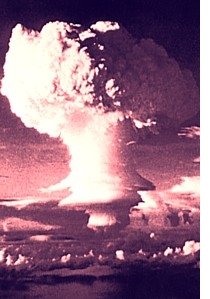Introduction:
The other day, my regular interlocutors at our local shopping centre regaled me with a new question: "What is AI?" And that turned into a discussion about ChatGPT.
I had to confess that I'd never used it. So, I thought I would 'kill two birds with one stone' and ask ChatGPT, for material for an article for my website.
Since watching the movie Oppenheimer, reviewed elsewhere on this website, I've found myself, from time-to-time, musing about the development of the atomic bomb and it's profound impact on the modern world.
Nuclear energy has provided a backdrop to my entire life. The first "atomic bombs" were dropped on Japan the month before I was born. Thus, the potential of nuclear energy was first revealed in an horrendous demonstration of mankind's greatest power since the harnessing of fire.
Very soon the atomic reactors, that had been necessary to accumulate sufficient plutonium for the first bombs, were adapted to peaceful use. Yet, they forever carried the stigma of over a hundred thousand of innocent lives lost, many of them young children, at Hiroshima and Nagasaki.
The fear of world devastation followed, as the US and USSR faced-off with ever more powerful weapons of mass destruction.
The stigma and fear has been unfortunate, because, had we more enthusiastically embraced our new scientific knowledge and capabilities to harness this alternative to fire, the threat to the atmosphere now posed by an orgy of burning might have been mitigated.
Method:
So, for this article on the 'atomic bomb', I asked ChatGPT six questions about:
- The Manhattan Project;
- Leo Szilard (the father of the nuclear chain reaction);
- Tube Alloys (the British bomb project);
- the Hanford site (plutonium production);
- uranium enrichment (diffusion and centrifugal); and
- the Soviet bomb project.
As ChatGPT takes around 20 seconds to write 1000 words and gives a remarkably different result each time, I asked it each question several times and chose selectively from the results.
This is what ChatGPT told me about 'the bomb':
ChatGPT created all that follows, selectively edited by me but otherwise unchanged, except for my comments (as marked in blue).
(note that it occasionally uses American spelling and likes to say "However," instead of "Yet," or "But"):
How IT (ChatGPT) does this is the subject of a separate article.

